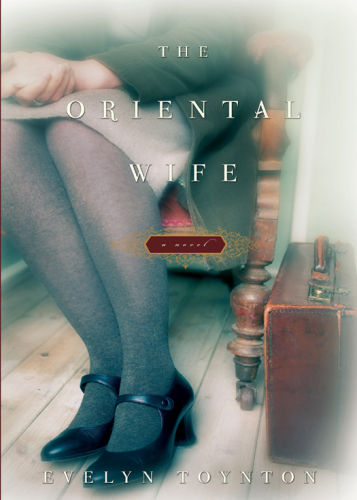
The Oriental Wife
A Novel
کتاب های مرتبط
- اطلاعات
- نقد و بررسی
- دیدگاه کاربران
نقد و بررسی

May 2, 2011
Toynton's second novel is a sad, quiet tale of desperate refugees from Nazi Germany trying to build new lives in America while holding on to pieces of their past. Louisa, the teenage daughter of Jewish parents, is sent to an international school in Lausanne, Switzerland, where she persuades herself she's fallen in love with Julian, a schoolmate's brother, although she's more in love with the idea of him than the actual man. She travels to London before the war, where she drifts into a relationship with Phillip, another Englishman, who wants to write about the experiences of German-Jewish refugees. Phillip takes her with him to the U.S., promising marriage, hoping Louisa can help him gain access to refugees through her cousin Otto and his friend Rolf. When Phillip becomes abusive and alcoholic, Louisa flees back to Otto and Rolf, and winds up marrying Rolf. What seems like a fresh hope for the future quickly descends into years of endurance after a medical diagnosis changes all their livesâLouisa's, Rolf's, and their daughter, Emma's. The writing is beautiful, but the book is unrelentingly sad. Even during the brief passages of happiness, one waits for Toynton to drop the inevitable other shoe on the heads of her unlucky characters.

May 15, 2011
Painful echoes of the Holocaust resonate in Toynton's literary effort.
In the troubled years between the World Wars, Rolf and Otto, and Otto's cousin, Louisa, children of prosperous Jewish families in Nuremberg, Germany, become devoted friends. In the midst of growing unrest and increasing anti-Semitism, Franz and his wife, a woman plagued by "nerves," send Louisa to a Swiss boarding school, then to England. Rolf's family too realizes Hitler's hell is descending on Jews. With family help, Rolf emigrates to America, finds employment and plunges into volunteer work helping other Jews escape. Otto follows. Louisa, however, is seduced by one Englishman, and then another, before the friends finally meet in New York City. Stolid, conservative Rolf and fun-loving, adventurous Louisa marry, each seeking what the other will never be able to give. Louisa becomes pregnant. Then she is almost immediately diagnosed with a benign brain tumor. Surgery leaves her partially paralyzed and baby Emma in the care of a duplicitous housekeeper, a hypocrite Rolf cannot recognize. That Louisa is no longer the person Rolf idealized leads to divorce, something they each regard as a confirmation of their destiny to be unhappy. Adult Emma sees the divorce as betrayal, a failure later mirrored when Emma is betrayed by her own lover, a mysterious Cambodian activist. While almost every other character is superbly realized, Otto's story is the least explored, perhaps presenting him as a metaphor for those who escaped without crippling emotional damage. Toynton also delves into the melancholy fate of Louisa's parents and their friends, a doctor and his wife, who fled the Nazis but languish in America, haunted by the "Old World...with all its weight of senseless suffering." Toynton's work is deeply emotional, capturing the malaise shadowing those from whom everything familiar, everything loved, has been stolen, symbolized at the novel's conclusion by an heirloom locket snatched away from Emma by a mugger.
A first-rate literary work and a character study of loss.
(COPYRIGHT (2011) KIRKUS REVIEWS/NIELSEN BUSINESS MEDIA, INC. ALL RIGHTS RESERVED.)

June 1, 2011
Toynton (Modern Art) returns with the story of Louisa and Rolf, childhood friends in Nuremberg who escape Hitler's Germany and eventually settle in New York. Louisa leaves as a young woman to study art history in London and travels to New York with her English boyfriend. Rolf works diligently to find sponsors and employment for Jewish refugees trying desperately to get to America. It seems that serious, almost melancholy Rolf and the modern, glamorous Louisa have little in common, but when she seeks out Rolf and their mutual friend Otto after her relationship ends and she has nowhere to go, Rolf and Louisa fall in love. They marry and settle into a happy life in their Jewish community of friends and old neighbors, and they have a daughter. Unfortunately, a disastrous event shatters their marriage, and their plans for the future are tragically altered. VERDICT At times very sad, this nonetheless enjoyable novel will certainly appeal to those with an interest in Jewish literature as well as to general readers.--Shaunna Hunter, Hampden-Sydney Coll., VA
Copyright 2011 Library Journal, LLC Used with permission.

June 1, 2011
A decade after her New York Times Notable Book of the Year, Modern Art (2000), Toynton turns from artist Jackson Pollock to German Jewish immigrants in post-WWII New York. Though she's been his friend since childhood, beautiful but naive Louisa realizes that Rolf has always been in love with her. Once married to him and pregnant, she is stricken with a brain tumor. Surgery removes it but leaves her partially blind and paralyzed, unable to care for herself or the child. Her personality turns from bubbly and vivacious to hopeless and distant. The woman he once loved now repulsive to him, Rolf wonders whether happiness can be found elsewhere and rescues himself from a lifetime with the husk of Louisa's former self. Meanwhile, Louisa remains the loyal Oriental wife, never wavering in her love for her husband. Toynton's prose is simple and spare, which well suits the grim tone of the novel, for its detachment makes it bearable. An intense and moving story of post-Holocaust Jewish immigrants.(Reprinted with permission of Booklist, copyright 2011, American Library Association.)

























دیدگاه کاربران